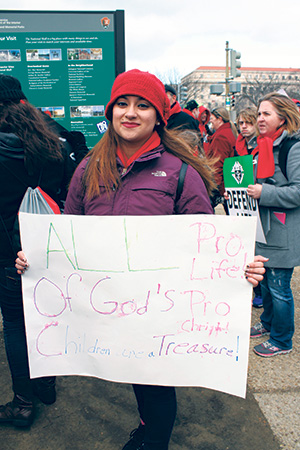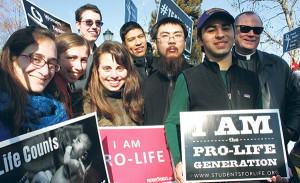
By Nate Madden
WASHINGTON (CNS) – On a chilly and cloudy morning on the National Mall in Washington, crowds gathered Jan. 22 for the annual March for Life, this year marking the 42nd anniversary of the U.S. Supreme Court’s Roe v. Wade decision legalizing abortion virtually on demand.
Tens of thousands of participants gathered first to hear a lineup of speakers, before marching from the Mall up Constitution Avenue to the U.S. Supreme Court building on Capitol Hill.
Moments before he offered the closing prayer at the DC Armory Mass, Cardinal Daniel N. DiNardo of Galveston-Houston, who was the main celebrant there, scanned the crowd from his vantage point near the altar set up at the stage, and said, “It’s really a beautiful sight, to look out and see so many young people saying ‘yes’ to life. How beautiful it is!”
A couple of hours earlier during the rally that preceded the Armory Mass, Cecilia Riepenhoff, a freshman from Lima Central Catholic H.S. in Ohio, sat in the top row in the farthest section from the altar with about 40 fellow classmates and members of St. Rose parish in Lima who had ridden a bus for about eight hours to attend the March for Life.
She too, enjoyed the view from her vantage point, as sections of the arena were filled with young marchers wearing an array of bright matching colors, including blue, green, orange and red.
“It’s great to see there are so many people (who are pro-life). … It’s really cool, all these people are here for that,” she told the Catholic Standard, Washington’s archdiocesan newspaper. “They believe what I believe in.”
Early in the day, Pope Francis showed his support of the pro-life gathering by tweeting the theme: “Every Life is a Gift” with the hashtag #marchforlife.
By late morning, the temperature had reached about 40 degrees, warmer than many a previous march, and a music group opened the rally with the songs “To Be Loved” and “You’re Not Alone.” The music was upbeat with lively mandolin licks and the powerful voice of the lead singer.
Several members of Congress were in attendance, including U.S. Rep. Tim Huelskamp, R-Kansas, who told Catholic News Service, “I am here to make my colleagues listen.” Huelskamp said life is a core issue in the public debate, and that Kansas was already at the forefront of human rights issues.
“They were at the forefront of the slavery issue,” he said, and are now at the forefront of the life issue.
Levi Fox, a volunteer and a graduate of Liberty University, Lynchberg, Va., said, “Half of our generation is missing. Sixty million have been killed since Roe v. Wade, which is why I am dedicating my time to the March for Life.”
After the musical opening, Patrick Kelly, chairman of the March for Life board, told the crowd they were attending “the largest and most important human rights rally in the world,” and noted the march is becoming “bigger and younger every year.”

Archbishop Joseph E. Kurtz of Louisville, Kentucky, the president of the U.S. bishops’ conference, opened the rally with prayer alongside priests, bishops and patriarchs of the Greek Orthodox, Orthodox American, Antiochean Orthodox and Serbian Orthodox churches, in a show of what the archbishop called “a sign of Christian unity.”
The archbishop called the marchers to not only “be joyful witnesses to the gospel of life,” but also to be “loving and welcoming” to those in dire circumstances.”
Jeanne Monahan-Mancini, director of the March for Life, addressed the marchers, congratulating them for making a “pilgrimage” before focusing on this year’s theme.
“Every Life Is a Gift” emphasized that every life is a gift, regardless of a person’s difficulty or disability, and also was meant to emphasize that everyone has a call and a mission – and a role to play creating a culture of life.
A large congressional delegation in attendance emphasized the importance of the Health Care Conscience Rights Act before yielding the floor to a passionate and energetic address by Sen. Tim Scott, R-South Carolina, who said the defense of life was “the responsibility of every single person in America.” The conscience bill would implement a broad religious exemption and conscience protections for private employers who oppose the federal contraceptive mandate that is part of the Affordable Care Act.
Rep. Chris Smith, R-New Jersey, who followed Scott, told the crowd, “There have never been more pro-life lawmakers in Congress than we have today.”
